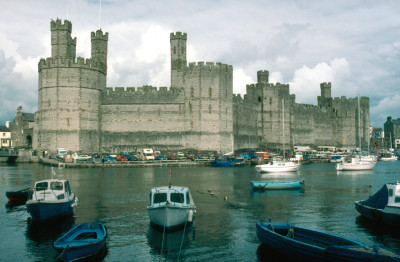This series has four easy 5 minute installments. This first installment: Welsh Pride; English Dominance.
Introduction
The region of Wales in the western part of the island had been the traditional refuge of survivors of the great invasions since Roman days. Its mountainous terrain made it defensible while the poverty of the area made the rewards not worth the risk. But as the Dark Age had given way to the Medieval Age, the risk/reward calculus had changed. The Prince of Wales, Llewelyn; had revolted, had been defeated; had submitted to English sovereignty; and was now reneging. The English king had had enough.
This selection is from History of England During the Early and Middle Ages by Charles H. Pearson published in 1876.
According to John Tregenza, “Pearson was the outstanding intellectual of the Australian colonies.
Time: 1277
Place: Wales

CC BY-SA 3.0 image from Wikipedia.
The whole force of the realm was summoned to meet at Worcester in June, 1277, and so well was the command obeyed that Edward found himself able to dispose of three armies. With the first he himself operated along the north, opening a safe road through the Cheshire forests, and fortifying Flint and Rhuddlan, while the ships of the Cinque Ports hovered along the coast and ravaged Anglesey. The “corps d’armee”, under the Earl of Lincoln and Roger Mortimer, besieged and reduced Dolvorwyn castle in Montgomeryshire. The third was led into Cardigan by Payne de Chaworth, who ravaged the country with such vigor that the South Welsh–being probably disaffected to a prince not of their own lineage–surrendered the castle of Stradewi and made a general submission.
Edward had avoided the fatal errors of previous commanders, who had risked their forces in a barren and difficult country. His blockade was so well sustained that Llewelyn was starved, rather than beaten, into unconditional submission.
With singular moderation, Edward had declined receiving the homage of the southern chiefs. He now granted Llewelyn honorable terms, November 5, 1277. A fine of fifty thousand pounds was imposed to mark the greatness of the victory, but remitted next day out of the King’s grace. Four border cantreds, old possessions of the English crown, which Llewelyn had wrested from it in the wars of the late reign, were to be surrendered to the English King, who already occupied them. Prisoners in the English interests were to be set free, and Llewelyn was to come under “an honorable” safe-conduct to London and perform homage. Edward had promised David half the principality, but with a reservation at the time that he might, if he chose, give him compensation elsewhere. He now elected to do this, moved, it would seem, simply by the wish not to dismember Llewelyn’s dominions, and David was made governor of Denbigh castle, married to the Earl of Derby’s daughter, and endowed with extensive estates. In every other respect Llewelyn was tenderly dealt with. The hostages exacted were sent back. The rent of one thousand marks stipulated for Anglesey was remitted. When the Prince of Wales came to London to perform homage he received the last favor of all, and was married sumptuously, at the King’s cost, to Lady Eleanor de Montfort.
There is no reason for supposing that Edward cherished any covert plans of absorbing Wales into England. Having wiped out the dishonor of his early years, and replaced England in its old position of ascendency, he had no motive for reviving bitter memories or dispossessing a great noble of his fief. The King’s conduct in giving his cousin to one who was only her equal through a usurped royalty; the inquests held in the marches to determine border law; the instructions to the royal judges, to judge according to local customs; the special commission appointed when Llewelyn thought himself aggrieved are curious evidence of fair-mindedness in a strong-willed and almost absolute sovereign. But in one respect Edward was ill-fitted to deal with an uncivilized people. He was overstrict for the times even in England, where his subjects almost learned, before he died, to regret the anarchy of his father’s reign. But his officers were nowhere harsher than in Wales, where the people, unaccustomed to a minute legality, complained that they were worse treated than Saracens or Jews. Old offences were raked up; wrecking was made punishable; the legal taxes were aggravated by customary payments; and distresses were levied on the first goods that came to hand, whether Llewelyn’s own or his subjects’.
The people of the four annexed cantreds were soon ripe for rebellion, David was alienated from the English cause by petty quarrels with Reginald Gray, Justice of Chester, who insisted on making him answer before the English courts, hanged some of his vassals, and carried a military road through his woods. The Welsh gentlemen complained that they were removed from offices which they had purchased, brought to justice for old offences which ought to have been condoned by the peace, and deprived of their jurisdiction in local courts. For a time the lady Eleanor tried to mediate between her husband and her cousin. But it was impossible that a stern, just man like Edward, penetrated with the most advanced doctrine of European legists and deriving his information from English employees, should be able to understand the position of the chief of a semi-barbarous nationality, who thought outrages on law matters to be atoned for by fines, while he brooded with implacable rancor over every slight, real or fancied, to his own position as prince of Wales, representative of a dynasty that had ruled “since the time of Camber the son of Brutus.”
Continued on Monday, August 3rd.
Leave a Reply
You must be logged in to post a comment.